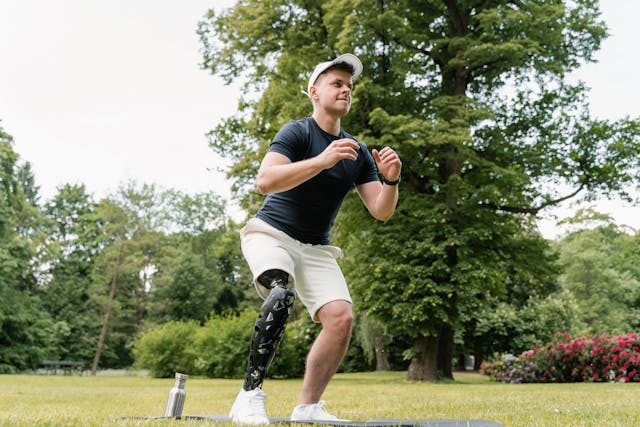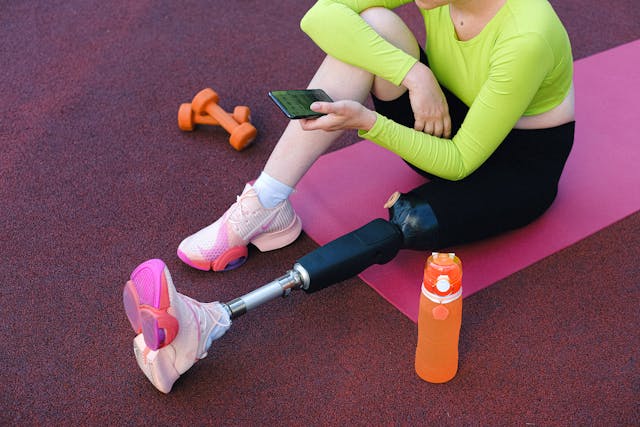When a child is born with a limb difference or undergoes an amputation early in life, the journey ahead can feel overwhelming for any parent. There are questions about mobility, acceptance, and how to give the child the best start. One of the most important parts of this journey is early prosthetic adaptation. But even more important than the technology or devices is the emotional and practical support that comes from parents. Parental involvement is often the biggest factor in how well a child accepts and uses a prosthetic in those early years.
At Robobionics, we’ve seen how powerful the role of parents can be. The way a parent responds, encourages, and engages with the child’s prosthetic journey sets the tone for how the child sees themselves and their possibilities. In this article, we will explore how parental support influences early prosthetic use, how to create a positive environment at home, and what strategies truly make a difference.
Understanding the Parent’s Influence
Children look to their parents for cues on how to feel and act. When it comes to prosthetic use, a parent’s attitude and actions shape the child’s comfort, confidence, and willingness to try.
Building a Foundation of Trust

When a child first receives a prosthetic, it’s more than just a tool—it’s a new experience. For many, it can feel unfamiliar or uncomfortable. This is where trust becomes essential. A parent who shows patience and encouragement can help the child feel safe. This trust allows the child to explore the device without fear of making mistakes.
When parents stay calm, answer questions simply, and allow the child to ask anything, it builds a strong foundation. Children then begin to believe that they are supported no matter what, even if they struggle or get frustrated.
At Robobionics, we encourage parents to sit with their child during early fittings and therapy. Even just being present in the room shows the child they are not alone in this process.
Reflecting Confidence and Positivity
Children often mirror the emotions they see. If a parent expresses worry or stress about the prosthetic, the child may begin to feel the same way. On the other hand, if the parent smiles, stays hopeful, and treats the prosthetic as a positive step forward, the child is more likely to do the same.
This doesn’t mean ignoring your own emotions—it’s normal to feel anxious. But showing your child that you believe in them, even when it’s hard, gives them strength. That small gesture of positivity can make the difference between giving up and trying again.
At Robobionics, we help families find this balance. We offer space to share worries privately so they don’t spill into moments when the child needs calm and steady encouragement.
Helping Your Child Feel in Control
One way to support early prosthetic use is to give your child some choices. Even young children like to feel involved. This might mean letting them pick the color of their prosthetic, decide when they want to practice, or choose a toy to try using with it. These small choices help them feel that the prosthetic is theirs—not something forced upon them.
When parents involve their child in small decisions, it leads to stronger emotional connection with the device. This increases use, reduces resistance, and builds a sense of ownership.
Robobionics encourages families to personalize prosthetics in ways that reflect the child’s personality. When the child is proud of how it looks and feels, they are much more likely to wear it with confidence.
Creating a Positive Routine at Home

Support doesn’t stop after leaving the clinic. What happens at home shapes how the child uses their prosthetic every day. Turning prosthetic use into part of the family’s routine makes it easier and more natural for the child to adapt.
Starting with Short, Simple Sessions
In the beginning, a child may only want to wear the prosthetic for a few minutes. That’s okay. Pushing them to wear it all day too soon can create discomfort or frustration. Instead, parents can start with short periods—during playtime, while reading a book, or when doing an activity the child enjoys.
These short sessions build tolerance without stress. Over time, the child becomes more comfortable, and the prosthetic becomes part of normal life. What begins as five minutes grows into longer wear without even noticing.
Robobionics offers guidance on how to build these routines gently. We help parents understand when to pause, when to encourage, and how to make each step feel like progress.
Using Everyday Tasks as Practice
Children learn through play and everyday activities. Instead of treating prosthetic use like a separate chore, parents can blend it into what the family already does. Simple things like brushing teeth, stacking blocks, or watering plants can become great ways to practice using the prosthetic.
When these moments are shared and supported, the child feels motivated. There is no pressure to “perform”—just a chance to try something new with a parent close by. This calm setting supports both physical skill and emotional security.
At Robobionics, we provide activity guides that help families turn regular routines into adaptive practice. These moments of learning fit naturally into each day.
Celebrating Small Successes Together
Every step forward is worth celebrating. Whether it’s picking up a toy, holding a spoon, or simply wearing the prosthetic longer than yesterday—these are big wins. Children need to hear that their efforts matter.
A kind word, a clap, or a hug can do more than a structured reward. It tells the child they’re doing something special, even if it feels small. When parents notice and appreciate progress, children gain confidence and try more on their own.
Robobionics encourages parents to track milestones, however small. These achievements create a story of growth that motivates both child and parent throughout the journey.
Helping Children Navigate Emotional and Social Challenges

While learning to use a prosthetic is often a physical process, it’s also deeply emotional—especially for young children who are just beginning to understand themselves and their place in the world. Parents play a key role in helping their child face emotional hurdles and social situations with strength and confidence. Early prosthetic adaptation is as much about feelings as it is about function.
Supporting Emotional Reactions with Patience
It’s normal for children to have mixed emotions about their prosthetic. They might feel curious one day and frustrated the next. Some days they may not want to wear it at all. Other times, they may feel proud and excited to show it off. These ups and downs are part of learning, not a sign of failure.
Parents can help by allowing space for those feelings. If a child is upset or tired, the best response is often a quiet presence, not a push to try harder. Letting them talk, cry, or take a break helps them feel safe. It also builds trust—your child knows that you’re there no matter what.
At Robobionics, we remind families that setbacks are expected. What matters most is the support that follows. Encouragement, patience, and gentle reminders help children return to the process when they’re ready.
Preparing for Questions and Interactions
As children begin using their prosthetic outside the home—in parks, schools, or social settings—they may face questions or stares from others. This can be confusing, especially at a young age. Helping your child prepare for these situations makes a big difference in how they respond.
You might practice simple answers at home, like “This is my helper arm” or “It helps me do things.” Giving your child these tools in advance gives them a sense of control. They’re less likely to feel embarrassed or caught off guard.
Parents can also speak with teachers and caregivers to ensure understanding and support in group settings. A little awareness goes a long way in helping your child feel included.
Robobionics works with families and schools to offer educational sessions that normalize prosthetic use. We believe that acceptance grows when children feel proud to explain their device, not hide it.
Encouraging Identity Beyond the Prosthetic
It’s easy for children—and sometimes adults—to focus too much on the prosthetic. But children are so much more than their limb difference. They are artists, thinkers, athletes, storytellers, and dreamers. A parent’s role includes helping the child build an identity that celebrates all of who they are.
When the focus stays on strengths and interests, the prosthetic becomes just one part of the picture—not the whole story. Children who are encouraged to explore hobbies, express emotions, and connect with others build a stronger sense of self. This emotional resilience helps them adapt to challenges, including using a prosthetic.
At Robobionics, we remind parents that the prosthetic is a tool—not a definition. We support every child’s unique personality and help families create an environment where growth goes far beyond the device.
Building a Long-Term Support System for Continued Progress

Prosthetic adaptation doesn’t happen in a day or even a few weeks. It’s a process that grows with the child, and that means families need lasting support—not just during the first fitting, but throughout every new stage of development. As the child’s body changes and their activities evolve, their relationship with the prosthetic will also shift. This is where a stable, responsive support system becomes so important.
Staying Connected with Your Prosthetic Care Team
After the first fitting, it’s common for children to need adjustments in socket size, alignment, or comfort. As they grow, the prosthetic may need to be resized or upgraded. Without regular check-ins, the device might become uncomfortable or less useful, which can lead to reduced wear time or frustration.
Parents play a key role in maintaining communication with the prosthetic care team. Noticing signs like red marks, reduced use, or changes in balance can help catch problems early. Scheduling follow-ups, sharing updates, and staying informed ensures that the prosthetic always meets the child’s needs.
At Robobionics, we offer scheduled check-ins and a clear care pathway to guide families through growth stages. We believe that prosthetic care should adapt with the child, not the other way around.
Partnering with Schools, Therapists, and Community
No child grows up in isolation. School, physical therapy, and community play a big part in how they learn, connect, and thrive. Parents can strengthen their child’s progress by partnering with teachers, therapists, and support groups. Sharing information about the prosthetic, setting goals, and creating a positive space for questions can help others support your child better.
Simple steps like explaining how the prosthetic works, showing classmates how it helps, or including it in classroom activities can normalize the experience. When the child sees others understand and accept their device, they’re more likely to feel confident and supported.
Robobionics offers resources and collaboration with educators and therapists to create a full-circle approach. We help families extend care beyond the clinic into everyday spaces where it truly matters.
Preparing for Future Changes and Milestones
As children grow into teens, their needs become more complex. They may start to ask for more control over their prosthetic design, function, or appearance. Some may want to explore sports prosthetics, while others may seek more stylish or advanced devices. These changes are part of natural development, and early support from parents makes this transition smoother.
Being open to your child’s changing needs, listening to their goals, and staying connected with your prosthetic provider helps you prepare for what’s next. Instead of seeing upgrades as problems, families can treat them as signs of growth and independence.
At Robobionics, we provide life-stage planning, upgrade options, and emotional guidance for older children and teens. We walk with families through every step, ensuring that the support never stops.
Encouraging Independence While Staying Involved

As your child becomes more confident with their prosthetic, they’ll naturally start doing more on their own. This is a beautiful part of the journey—but it doesn’t mean your role as a parent becomes less important. In fact, guiding your child toward independence while staying supportive in the background is one of the most powerful things you can do.
Letting Your Child Take the Lead
There comes a point when your child begins to express preferences—how they want to use their prosthetic, when they feel like wearing it, or even what design they’d like next. This is a sign of maturity and ownership. Letting them take the lead in small decisions shows them that their voice matters. It also teaches them how to advocate for their own needs.
This doesn’t mean stepping back completely. It means shifting your role from decision-maker to mentor. You’re still there, watching, supporting, and guiding—but now, you’re empowering them to be part of the process.
At Robobionics, we encourage shared decision-making. We include children in consultations and give them space to explore their identity with the prosthetic, because this helps build true independence.
Balancing Freedom with Gentle Guidance
Every child learns at a different pace. Some may be eager to try everything on their own, while others may still look for reassurance. The key is balance. Give your child freedom to try, but offer gentle help when they need it. If they struggle with a new activity, support them without stepping in too quickly. Letting them face small challenges builds confidence in the long run.
It’s also okay to set boundaries—especially when safety is involved. But instead of giving strict rules, involve your child in making those boundaries. Explain why something matters, and ask how they feel about it. This turns rules into shared goals.
Robobionics works with families to find that balance. We help parents create plans that respect the child’s growing need for independence, while also ensuring that learning continues in a safe, supportive way.
Being There for Every New Step
As your child grows, so will their dreams. They may want to join a sports team, play an instrument, or explore a creative hobby. Sometimes, they’ll succeed easily. Other times, they may feel unsure. But no matter what, knowing that you’re there cheering them on makes all the difference.
Your belief in them becomes their belief in themselves. Whether it’s their first day at school with a new prosthetic or their first big presentation, your quiet support behind the scenes gives them the courage to keep moving forward.
At Robobionics, we don’t just build prosthetics—we build relationships with families. We’re here to support every parent, because we know that behind every confident child is a committed, caring adult.
Conclusion
Early prosthetic adaptation is not just about fitting a device—it’s about nurturing a child’s growth, confidence, and identity. While technology plays a role, it’s the steady presence of a parent that shapes how a child embraces their prosthetic journey. Through trust, routine, encouragement, and honest communication, parents help their children see possibilities instead of limitations.
From first steps to everyday tasks, your support gives your child the strength to try, to learn, and to thrive. You help them see that their prosthetic is not something to hide, but a tool to explore the world with courage. And as they grow, your guidance continues to be the foundation that supports their independence.
At Robobionics, we are honored to walk this journey with families across India. We believe that every child deserves care that is not only advanced but also deeply human. And we know that with the right support, there’s no limit to what your child can achieve.
If you’re a parent exploring prosthetic options for your child, we’re here to guide you at every step.



